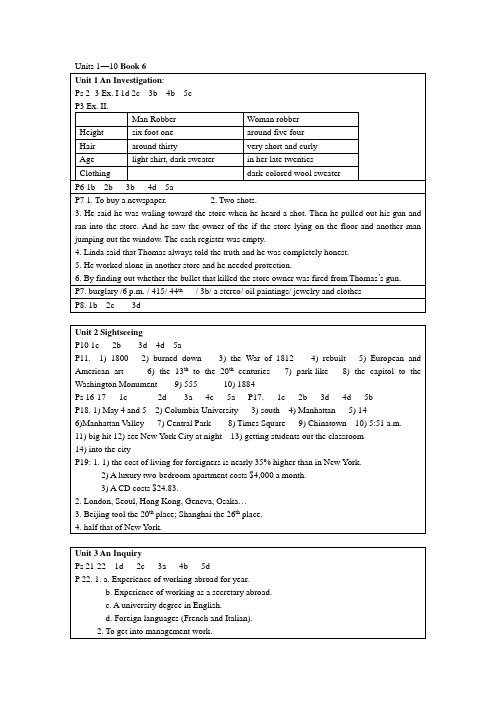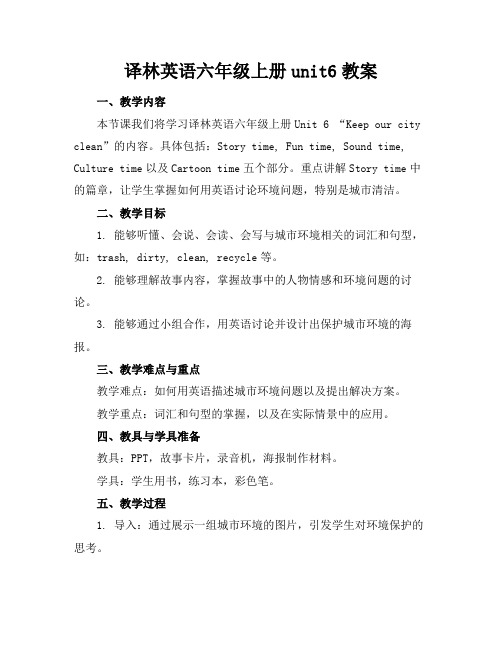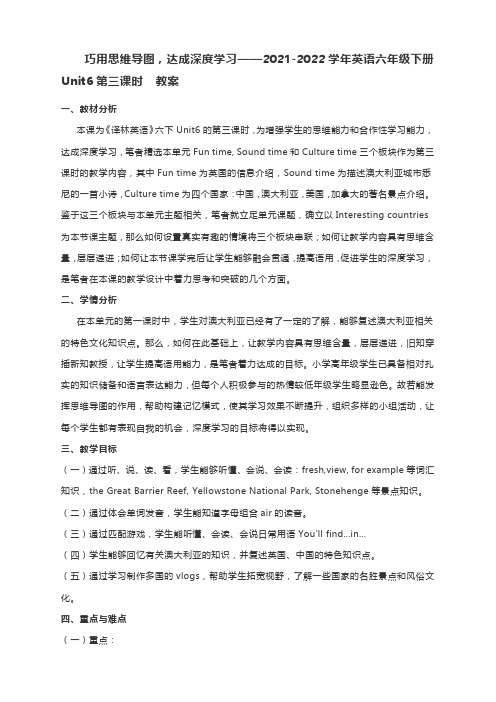Unit 6 Time Culture
大学英语听力第6册全书答案

P37. 1) had died 2) exercise 3) possible 4) preferable 5) lifestyle factors 6) preventable
7) cure 8) prevented 9)taking pills 10) cured 11) treatable 12) drunk driving
批注本地保存成功开通会员云端永久保存去开通
Units 1—10Book 6
Unit 1 An Investigation:
Ps 2 -3 Ex. I 1d2c3b 4b5c
P3 Ex. II.
Man Robber
Woman robber
Height
six foot one
around five four
2) A luxury two-bedroom apartment costs $4,000 amonth.
3) A CD costs $24.83.
2.London,Seoul, Hong Kong,Geneva,Osaka…
3.Beijingtool the 20thplace; Shanghai the 26thplace.
c. They don’t want the tippee to think they’re cheapskates and they don’t want to look as though they’re form out of town by tipping too much.
2. Bernard Shaw received a terrible service. The waiter ignored the great playwright and mixed up his orders. On top of all this, he was rude. After paying the check Shaw looked at the waiter in the eye, dropped a fifty-dollar bill on the table and said, “This is what I tip for bad service.”
译林英语六年级上册unit6教案

译林英语六年级上册unit6教案一、教学内容本节课我们将学习译林英语六年级上册Unit 6 “Keep our city clean”的内容。
具体包括:Story time, Fun time, Sound time, Culture time以及Cartoon time五个部分。
重点讲解Story time中的篇章,让学生掌握如何用英语讨论环境问题,特别是城市清洁。
二、教学目标1. 能够听懂、会说、会读、会写与城市环境相关的词汇和句型,如:trash, dirty, clean, recycle等。
2. 能够理解故事内容,掌握故事中的人物情感和环境问题的讨论。
3. 能够通过小组合作,用英语讨论并设计出保护城市环境的海报。
三、教学难点与重点教学难点:如何用英语描述城市环境问题以及提出解决方案。
教学重点:词汇和句型的掌握,以及在实际情景中的应用。
四、教具与学具准备教具:PPT,故事卡片,录音机,海报制作材料。
学具:学生用书,练习本,彩色笔。
五、教学过程1. 导入:通过展示一组城市环境的图片,引发学生对环境保护的思考。
2. 新课内容:带领学生学习Story time,讲解生词和句型,让学生通过听、说、读、写的练习来掌握知识。
a. 预习:让学生独立阅读故事,了解大意。
b. 讲解:对生词和句型进行讲解,引导学生理解故事细节。
c. 练习:进行听力、口语、阅读和写作练习,巩固所学内容。
3. 例题讲解:选取Story time中的难点句型进行讲解,并通过实际例题进行演示。
4. 随堂练习:让学生进行小组讨论,设计保护城市环境的海报。
六、板书设计1. 生词和短语:trash, dirty, clean, recycle等。
2. 重点句型:e.g. "How can we keep our city clean?", "We should recycle the trash."3. 海报设计要素:图片、、口号、建议等。
跨文化沟通unit6表格time and culture

一次专注于一个任务
高度重视
较低
未来取向
多时制文化(Polychronic)
时间是灵活的,可重叠的
同时处理多个任务
较为灵活
较高
过去/现在取向
西方文化(如美国、德国)
强调效率和准时
严格安排日程
非常守时
较低
未来取向,强调计划目标
东方文化(如中国、日本)
强调关系和和谐
较为灵活的时间安排
跨文化沟通unit6表格time and culture
在跨文化沟通中,时间与文化之间的关系是一个重要的议题。不同的文化对时间的认知、价值观和使用方式可能大相径庭。以下是一个关于“时间与文化”的简要表格,概括了不同文化背景下时间的几个关键方面:
文化类型
时间观念
时间使用
守时性
灵活性
时间取向
单时制文化(Monochronic)
较为守时,但有一定弹性
较高
过去/现在取向,重视历史和传统
南方文化(如拉丁美洲、中东)
时间观念较为宽松
更注重人际交往
较为灵活,不太严格
非常高
现在/未来取向,重视家庭和社交活动
非洲文化
时间观念较为灵活
重视社区和集体活动
较为灵活,但重视事件
非常高
现在/过去取向,强调社区和共享
请注意,这个表格仅提供了一些概括性的信息,实际情况可能因国家和地区、个人差异以及全球化影响而有所不同。在跨文化沟通中,了解并尊重对方文化的时间观念和使用方式对于建立有效沟通和良好关系至关重要。
Eglish Unit6 food culture

Environment
4)• contributes greatly to dining experience
Food
1) • quality • cooking style: eight famous
cuisines in China, different tastes
3• )good service: may give you a better experience
Food
Apart from the quality of the food, we also pay attention to the cooking style. There are eight famous cuisines in China, offering various choices. People with different backgrounds may like different tastes.
Price
We should choose a restaurant within a proper price range. Spending too much money on eating is unwise.
Read and choose. 阅读以下课文,选择合适的标题。
Service
Good service may give you a better experience. Bad service may ruin your meal.
√ C. How to Choose a Restaurant
Read and complete. 再读上页课文,补全以下有关选择餐馆的思维导图。
Location • weekdays: within walking distance • weekends: a little bit further
七年级上册Unit 6 人教版英语中考一轮复习(词汇+语法讲解)

一轮复习:七上U6 词汇+语法讲解【单词默写】【单词变性】healthy形容词变名词______________ really副词变形容词______________ well副词变形容词______________ week名词变形容词______________1. well ______________ _____________________ ___________________ ________________Well, let’s talk about it next time.Mary does well in English.I don't feel very well today.You can get water in the well.2. right ______________ _____________________ ___________________ ________________ ______________ Everyone has his own rights in the society.Yes, that’s right.All right, let’s go to the cinema.I’m sorry. That’s all right.I sit on the right of Mary while Mary sits on the left of me.3. then __________ ___________Till then, everything is too late.First, you put the meat into the pot. Then, mix it with water.4. question ________________ ________________I have many questions to ask my teacher.I was questioned by a policeman about the murder last night.5. want ________________ ________________I want to stay at home because of the rain.You are wanted to be a volunteer.The thief was wanted on the web.Do you want something to drink?【词汇用法】1. sure: adv./adj./be sure to do sth./be sure that…/make sure that…/make sure to do sth.2. so: adv./conj./so adj./adv. that/so that/so as to/not as adj./adv. so/I think so/I hope so.相关词辨析: because vs. sobecause: conj./因为/不与so连用so: conj./所以/不与because 连用3. habit: n./develop a habit of/break a habit of/good habits/bad habits近义词辨析: habit vs. custom vs. culturehabit: n./习惯custom: n./习俗culture: n./文化4. be: v./be+Adj./be+done/be+n./be+to do/be +doing/be +PP(prep. Phrase)5. eat: vt./eat sth./eat up近义词辨析: have vs. eathave: vt./have lunch(享用一餐)eat: vt./eat rice(享用具体的东西)【攻占语法】动词(二) 实义动词一、动词的分类: ____________ _____________ _____________ ______________二、动词的位置: 在句中充当_____________, 放在___________ 的前面或_____________的后面三、动词的用法:2. 实义动词1) 感官动词look/sound/taste/smell/feel +adj.2) 感观动词watch/see/hear/observe sb. do/doing sth.3) 使役动词make/let/have sb. do sth.get sb. to do sth.make sb./sth. donehave sth. donehave sth. doingget sb./sth. done4) 及物动词动词+名词5) 不及物动词动词单独使用动词+介词+名词请在及物动词的框内打”√”,不及物动词的框内打”×”□ask□buy □call□come □eat□excuse □find □finish □get□go□have□know□let□like□look□lose□meet□need□play□say□see□sell□sound□spell□take□thank□think□want□watch□help□love6) 双宾语动词动词+间接宾语+直接宾语动词+直接宾语+to/for +间接宾语请在是双宾语动词的框内打”√”□teach □learn □buy□sell□order □lend □borrow □dress□bring□take□send□give□tell□pay□hand□show□offer□read□pass□help□want【词汇练习】1.Amy usually eats an a ________ after lunch because it's her favorite fruit.2.Let’s think about some food for Henry’s b ________ party.3.For b ________ I have a glass of milk and some bread. They are healthy.4.Potatoes, c ________, and cabbages are vegetables my son likes best.5.We always have rice, chicken and salad for d________.6.I want to know something about David, the volleyball star's e________ habit.7.I have e________ for breakfast every day.8.Judy likes eating sweet food and doesn’t like doing sports. As a result, she becomes f ________ and unhealthier.9.Eggs, milk and strawberries are all healthy f________.10.I eat f ________ and vegetables every day, which are good for my health.11. A good study h ________ will help you learn English well.12.Tom ate a big breakfast. He had a h ________, an egg and milk.13.Do you want to be h _______? Then you need to eat well and do sports every day.14.All the students have l________ at school from Monday to Friday.15.I can’t answer this q ________. It’s too difficult.16.I like English very much. It's r________ easy.17.I need some vegetables, fruits and yogurt to make fruit s ________.18.He doesn’t want to be late for school again, s ________ he eats quickly and runs to school.19.For fruit, Jack likes apples and s________.20.—Can you come to my party?—That’s for s _______.21.I want a bowl of t ________ noodles, because I like vegetables very much.22.Eat more v ________ and less meat, then you will be healthier.23.We have five English classes a w________.24.It is w________ known that Hangzhou is a perfect city for sightseeing.25.Please come to our club, you are w ________ to join us!【参考答案】healthy形容词变名词health really副词变形容词real well副词变形容词good week名词变形容词weekly1. well 好吧擅长感觉舒服井Well, let’s talk about it next time.Mary does well in English.I don't feel very well today.You can get water in the well.2. right 权力对的好吧没关系右边Everyone has his own rights in the society.Yes, that’s right.All right, let’s go to the cinema.I’m sorry. That’s all right.I sit on the right of Mary while Mary sits on the left of me.3. then 那时然后Till then, everything is too late.First, you put the meat into the pot. Then, mix it with water.4. question 问题询问I have many questions to ask my teacher.I was questioned by a policeman about the murder last night.5. want 想应聘通缉想要I want to stay at home because of the rain.You are wanted to be a volunteer.The thief was wanted on the web.Do you want something to drink?一、动词的分类: be 动词情态动词助动词实义动词二、动词的位置: 在句中充当谓语,放在主语的前面或宾语的后面三、动词的用法:请在及物动词的框内打”√”,不及物动词的框内打”×”√ask√buy √call×come √eat√excuse √find √finish √get×go√have√know√let√like×look√lose√meet√need√play√say√see√sell×sound√spell√take√thank×think√want√watch√help√love6) 双宾语动词动词+间接宾语+直接宾语动词+直接宾语+to/for +间接宾语请在是双宾语动词的框内打”√”√teach □learn √buy √sell √order √lend□borrow□dress√bring□take√send√give√tell√pay√hand√show √offer √read√pass□help□want【词汇练习】apple birthday breakfast carrots dinner eating eggs fatter food fruits habit hamburger healthy lessons question really salad so strawberries sure tomato vegetables week well。
巧用思维导图,达成深度学习——2021-2022学年英语六年级下册Unit6第三课时 教案

巧用思维导图,达成深度学习——2021-2022学年英语六年级下册Unit6第三课时教案一、教材分析本课为《译林英语》六下Unit6的第三课时,为增强学生的思维能力和合作性学习能力,达成深度学习,笔者精选本单元Fun time, Sound time和Culture time三个板块作为第三课时的教学内容,其中Fun time为英国的信息介绍,Sound time为描述澳大利亚城市悉尼的一首小诗,Culture time为四个国家:中国,澳大利亚,美国,加拿大的著名景点介绍。
鉴于这三个板块与本单元主题相关,笔者就立足单元课题,确立以Interesting countries 为本节课主题,那么如何设置真实有趣的情境将三个板块串联;如何让教学内容具有思维含量,层层递进;如何让本节课学完后让学生能够融会贯通,提高语用,促进学生的深度学习,是笔者在本课的教学设计中着力思考和突破的几个方面。
二、学情分析在本单元的第一课时中,学生对澳大利亚已经有了一定的了解,能够复述澳大利亚相关的特色文化知识点。
那么,如何在此基础上,让教学内容具有思维含量,层层递进,旧知穿插新知教授,让学生提高语用能力,是笔者着力达成的目标。
小学高年级学生已具备相对扎实的知识储备和语言表达能力,但每个人积极参与的热情较低年级学生略显逊色。
故若能发挥思维导图的作用,帮助构建记忆模式,使其学习效果不断提升,组织多样的小组活动,让每个学生都有表现自我的机会,深度学习的目标将得以实现。
三、教学目标(一)通过听、说、读、看,学生能够听懂、会说、会读:fresh,view, for example等词汇知识,the Great Barrier Reef, Yellowstone National Park, Stonehenge等景点知识。
(二)通过体会单词发音,学生能知道字母组合air的读音。
(三)通过匹配游戏,学生能听懂、会读、会说日常用语You’ll find...in...(四)学生能够回忆有关澳大利亚的知识,并复述英国、中国的特色知识点。
Unit 6-Cultural Shock 文化冲击

Cultural Difference
Cultural Difference
Cultural Difference
Cultural Difference
Cultural Shock
The "Honeymoon Phase"
During this period the differences between the old and new culture are seen in a romantic light, wonderful and new. For example, in moving to a new country, an individual might love the new foods, the pace of the life, the people's habits, the buildings and so on.
父母的支持
驾照
路考
签发
着迷的
Global Understanding
unit6 world culture世界文化

post reading
• 1.role play:students play the roles from different countries and practice their own customs.
• 2.Do you think what we should do before we go abroad?
• • • •
observe [əbˈzɜ:v] 观察 display [dɪˈspleɪ] 显示 affection [əˈfekʃn] 感情 unacceptable [ˌʌnəkˈseptəbl] 的 • forbid [fəˈbɪd] 禁止 • interact [ˌɪntərˈækt] 互动
Touching Someone Where It's Offensive: Korea, Thailand, China, Europe, the Middle East. What's Offensive : Personal space varies as you travel the globe. In Mediterranean countries, if you refrain from touching someone's arm when talking to them or if you don't greet them with kisses or a warm embrace, you'll be considered cold. But backslap someone who isn't a family member or a good friend in Korea, and you'll make them uncomfortable. In Thailand, the head is considered sacred--never even pat a child on the head。 What You Should Do Instead :
- 1、下载文档前请自行甄别文档内容的完整性,平台不提供额外的编辑、内容补充、找答案等附加服务。
- 2、"仅部分预览"的文档,不可在线预览部分如存在完整性等问题,可反馈申请退款(可完整预览的文档不适用该条件!)。
- 3、如文档侵犯您的权益,请联系客服反馈,我们会尽快为您处理(人工客服工作时间:9:00-18:30)。
在恪守时间观念的文化中拖沓是无礼的。 同样,不照顾多样化时间观念文化的人们 不严格服从时间的行为也是没有礼貌的。
日程安排和最后期限
强烈的多样化时间观念文化不喜欢有严格期限。 比如,许多传统的阿拉伯商人认为努力掌握未来 是不虔诚和没有信仰的,是真主而不是人在住在 未来。 因此,如果你要多样化时间观念的伙伴在3月1 日送货或采取一些措施,那就要在2月1日甚至1 月15日与他们打招呼。而且,要在到最后期限的 整个过程中,不断地与他们接触。面对面接触是 加快进程的最佳办法。
埃及:“5分钟”就是半小时
如果埃及人说:“稍等,5分钟”,意思就是半小时;如果说 “半小时”,那就要做好准备——当天基本不行。可能是埃及人意识 到了这个问题,准备提高办事效率,近来在一些小事上常爱说:“稍 等,1秒钟”,那说明他们把握很大,5分钟内就可以结束战斗。 在埃及的中国人中流传这样一个经典笑话——与当地人打交道要 遵循“IBM定律”。IBM是阿拉伯语三个常用句的英语音译缩写: “如蒙主愿(但愿)”、“明天吧”和“没问题”。 “如蒙主愿”本来是一句伊斯兰宗教用语,在现代阿拉伯语中表 示将来时态的肯定语气。中国人对此很难理解,往往要求对方给一个 确定的回答。但埃及人认为,人在无所不能的真主面前是无能为力的, 因此不管多要紧的事情,埃及人回答时此语照用不误。这也成了很多 埃及人不守时的借口。
恪守时间观念的会议遵守既定的纲要和议程。 典型的德国、瑞士和瑞典的谈判会议上,几分钟 简短的开场白后,就会进入一个接一个的议题, 直到会议结束,基本不离题。 然而,在法国或者意大利的谈判会上,亲切 的聊天一直伴到最后的几分钟。并且,任何议程 你都可以从第五个开始,跳过第二个,然后同时 进行几个议题的讨论。
南美:等一秒钟
南美也一样。他们通常的口语是:等一 秒钟 ----大概你要等15分钟吧。如果说要等 一分钟就是半个小时。如果约好了下午四 点见面,你大可以干你想干的事到六点左 右,你的客人才会到。 南美洲人请你八点晚餐你就最好九点至 十点左右到,准时的人是抓去厨房帮忙的 好料子。
议程:灵活的和不变的
当你参加米兰的会议时,规则就变了。在 那里,你的客户或联系人迟到十分钟左右 也不会觉得抱歉。当你在意大利南部时, 会发现日程安排更为灵活。在罗马,你的 当地搭档会在约定的时间内去跳半小时的 华尔兹,而且会像什么事也没发生似的和 你打招呼。 越往南行,时间的多样性就越明显。到 了那不勒斯,拖延45分钟也被视为小事。
相对来说,居住在中纬度的多数人属于 恪守时间的人,而居住在热带气候地区的 人相对随意,灵活。越靠近赤道,时钟看 起来转的越慢。
多样化时间观念商务亚女商人飞往美国开一个重要的会议。会议计划在周 一上午十点钟开始。她到达波士顿已是周日深夜,由于旅途的颠簸很 快就睡着了,并在第二天早晨睡过了头。 周一这位女士乘坐出租车又迷失了方向。最后终于在午饭后赶到。 这时会议已经进行了四个小时。她要会见的美国人从会议室走出来对 她说,:“对不起,现在我们正在召开下午的会议,并我们这周的安 排已经满了……你可以在下个星期三来补救一下,可以吗?”她不得 不返回吉隆坡。 不久,这位多样化时间观念的女士出席了在东南亚召开的全球谈 判者论坛。午休期间,她讲述了这次惨痛的经历,说美国人如何的无 理与固守计划。“我飞越了半个地球赶到波士顿,就是为了参加会议。 那里的人没给晚到一会儿的外国访问者留一点点面子重新安排日程。 你能相信吗?”
时间文化
严格恪守时间观念的文化
北欧和德国 北美 日本
恪守时间观念的文化
澳大利亚,新西兰 俄罗斯和多数中东国家 南欧 新加坡,中国香港,中国台湾,中国内地 韩国
欧洲:南北差异
关于准时的定义,因在大陆的南部地区还是北部地区而不 同。 例如,你是国际出口营销员,计划在明天上午九点会 见汉堡的客户。德国市场的有经验者认为8:55到就非常 准时。九点到虽然技术上可以接受,但提前五分钟显示你 能够分享客户严格的守时观念。 迟到暗示了缺乏纪律性。一些德国人认为如果你约会 迟到十分钟,那么你就会迟到十周送货。 而在南部的慕尼黑,人们对待时间更随意一些,可以 准时到达会场,甚至迟到两分钟也不会错过销售机会。
